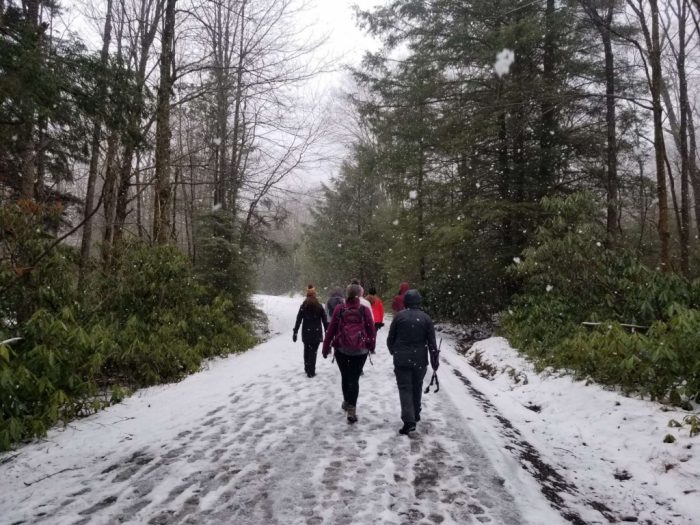How Heavy Are Your Thoughts on Trail? Tips for Negative Thinking While Hiking
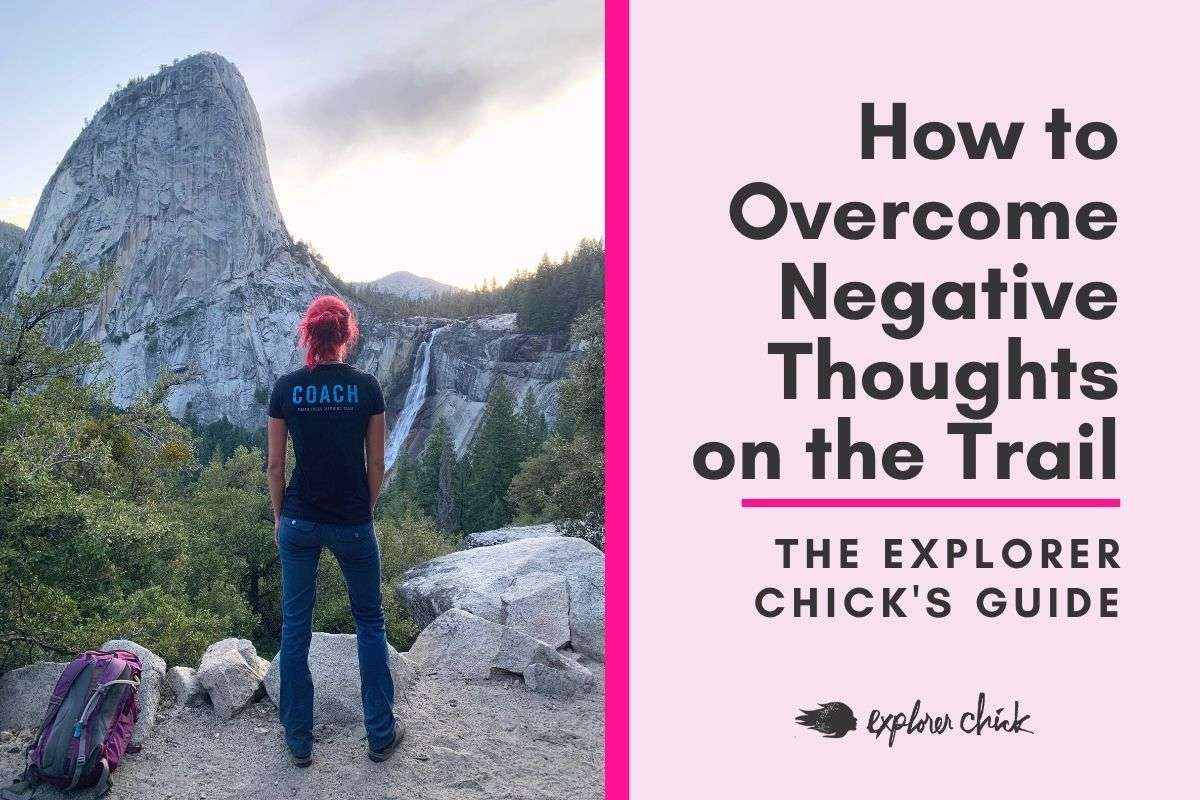
Explorer Chick Guide Kat has seven tips for positive thinking on your next hike.
“Your pack is heavy enough, you don’t need to add the weight of other people’s perceived expectations”
Explorer Chick Guide, Kat Porter
Okay, tell me if this sounds familiar. You’re out with a group hiking a challenging trail. You’re so excited to push yourself and be out in nature. But, as the first mile or two passes, you find yourself consistently at the back. The rest of your group is far ahead, maybe even out of view, and you find yourself needing frequent breaks. It’s then that the negative voice in your head takes over, and you start to beat yourself up more and more.
We carefully strategize what we bring on long hikes, so while our packs grow heavy on our backs and hips during grueling uphill treks, we can take some solace in knowing that we brought only what we needed.
But oftentimes, I’ve found it’s actually the heavy negative thoughts we carry on these trails that drag us down the most.
“I’m just slowing them down,” “I’m ruining the day,” “why did I come, I’m not as strong as them,” and “they probably hate me.” The thoughts continue in a downward spiral, and eventually, they can make you feel like giving up and going home.
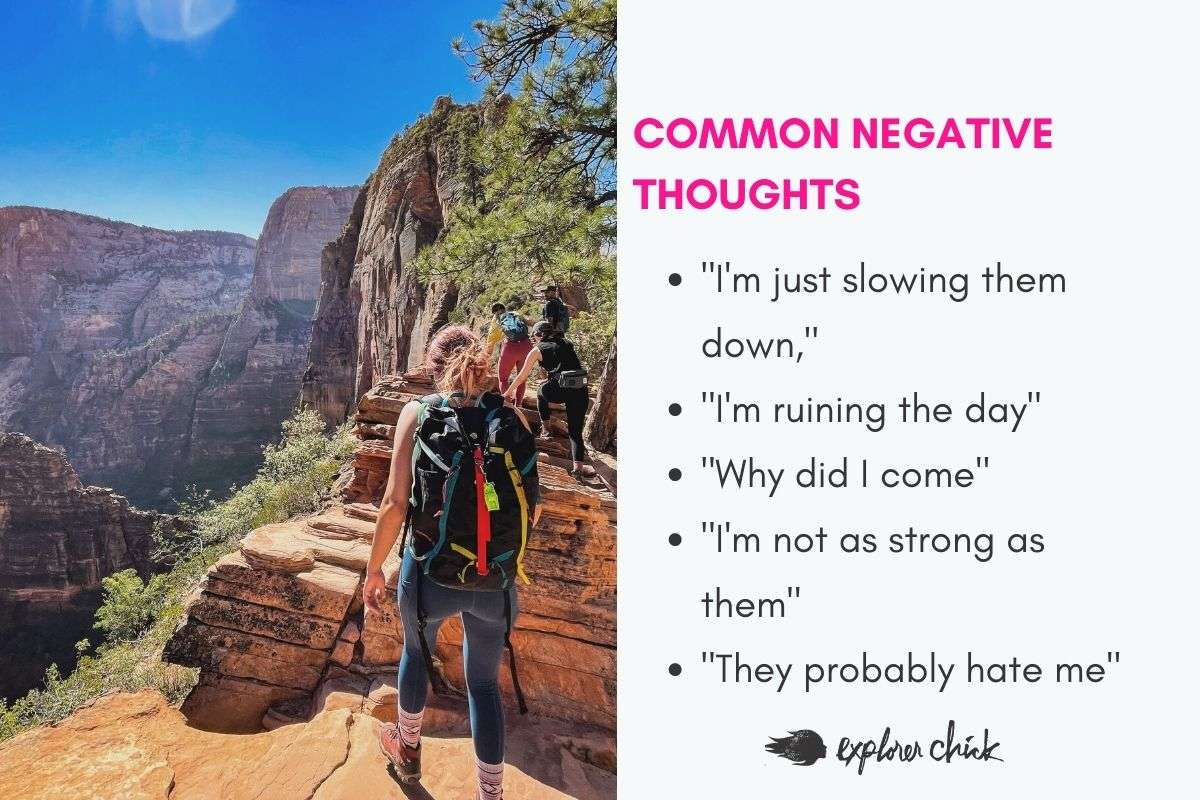
I found my outdoorsy side later in life, and my first long hike was with the outdoor club at my college. On my first trip, I was always at the back and soon found myself sitting and crying on a rotting log just off the trail, crying and hating myself. My head was full of negative self-talk.
My group came back to find me, and at first, they thought I’d injured myself. I was horribly embarrassed, and I apologized over and over again through my tears. I told them I was fine and would go back to the trailhead to wait at the cars.
They kindly laughed a bit and told me that going a bit slower just meant more time in nature, which was the entire reason we were out there in the first place.
I was shocked.
I was sure that they were frustrated at my slow pace and that I was a burden to the group. After taking a minute to collect myself, we continued on. The group adjusted their pace, and we all walked together. Over time I actually improved my pace, and we were all able to enjoy the beautiful overlook!
Tips for Correcting Negative Self Talk on Trail
Over my guiding career, I’ve collected tips and strategies for correcting negative self-talk during group and solo hikes. I hope they can help you be kinder to yourself on and off the trail!
1. Stay Present
We get depressed when we think about the past or things we can’t change, and we get anxious about what could happen in the future or how things could go wrong (usually, we think the worst, which is called catastrophizing). Try these strategies to refocus on the present and why you’re there:
- Count your steps until you reach 100, and then start again.
- Five senses: Pick out something around you that matches one of your senses. What do you hear? What do you smell? What do you see? You’re there to be in nature; you should enjoy it!
- Focus on your breathing: Try to slow your breath; box breathing is 4 seconds in, 4 holds, and 4 out. Try to inhale through your nose and exhale through your mouth. 3 seconds in, 3 seconds out. Not only does it help you clear your head and focus in the moment, but it will also help control your heart rate allowing you to hike better.
2. Don’t Mind Read
We often assume others think the worst of us when we are down. Try to challenge these assumptions that are actually just our own thoughts and fears that we are projecting into their minds. Would our friends really hate us? Is the whole day ruined because we are moving slower? Absolutely not! If you find yourself stuck in these assumptions, just ask what your friends are actually thinking! We often are so worried about other people’s experiences that we forget that we should also leave room to care about our own!
3. Be kind to yourself
Would you talk to a friend like that? Imagine if you said all the negative things out loud to your best friend. Would you ever actually think or say those harsh words? If not, why is it okay to talk and beat yourself up like that? Try to be kinder to yourself; you’re already pushing yourself physically on the trail. No need to add the extra weight of self-hatred.

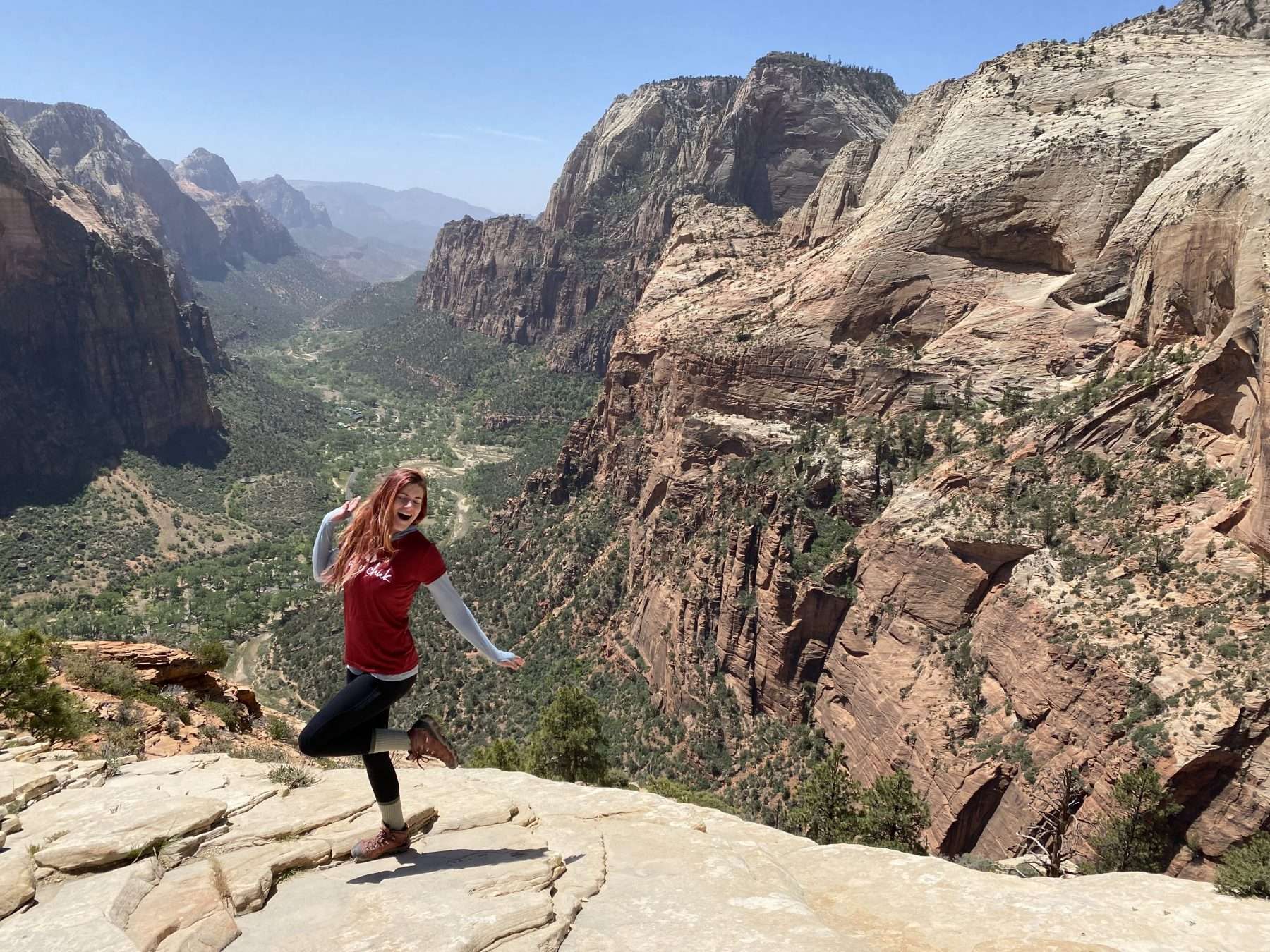
4. Find solutions to the problems you’re facing at the moment
Ask yourself, “What can I do now that might help?” Think of the next best thing you can do in a tough situation. For example, if you’re moving slowly due to blisters, treat them with moleskin, don’t just suffer!!
5. Say “Thank You” instead of “I’m Sorry.”
I don’t know why we think of ourselves as burdens and feel the need to apologize for every little thing. Gratitude can often replace an apology. “Thank you for waiting and staying with me” instead of “I’m sorry I’m moving so slow.”
6. Remember why you’re there!
Goal setting is important to give us a reference for how we are doing. Yes, if the agreed goal for the group was to do a hike as fast as possible, then maybe walk behind at your own pace and meet them at the end. But, if the goal is to be together with good people out in nature, you will achieve that no matter what pace you take!
7. Celebrate the Victories
Break up the hike into smaller chunks. It’s not just trailheads and summits. Focus on getting to the next switchback or to the next ridge, and then be proud you made it!! After completing sections with the most elevation gain, I like to reward myself with my favorite trail snack, sour gummy worms.
These tricks are a combination of what I’ve learned from others and what I’ve found works for myself. Most concepts are based on techniques taught through Cognitive Behavioral Therapy(CBT), a therapeutic method to help cognitive distortions and negative self-talk that I studied to help support the athletes I’ve coached over the years. I am not a therapist, but if any of these tricks helped you out and you want to learn more, check out the resources below.
I hope our paths cross on trails someday and, if they do, that your mind is unburdened from nasty negative thoughts! I will end by sharing my favorite quote:
“If you want to go fast, go alone. If you want to go far, go together.”
African proverb / Author Victoria Odoi-Atsem
Happy Trails!
Cognitive Behavioral Therapy Resources:
- What is Cognitive Behavioral Therapy
- List of Cognitive Distortions
- Challenging Negative Thoughts Worksheet
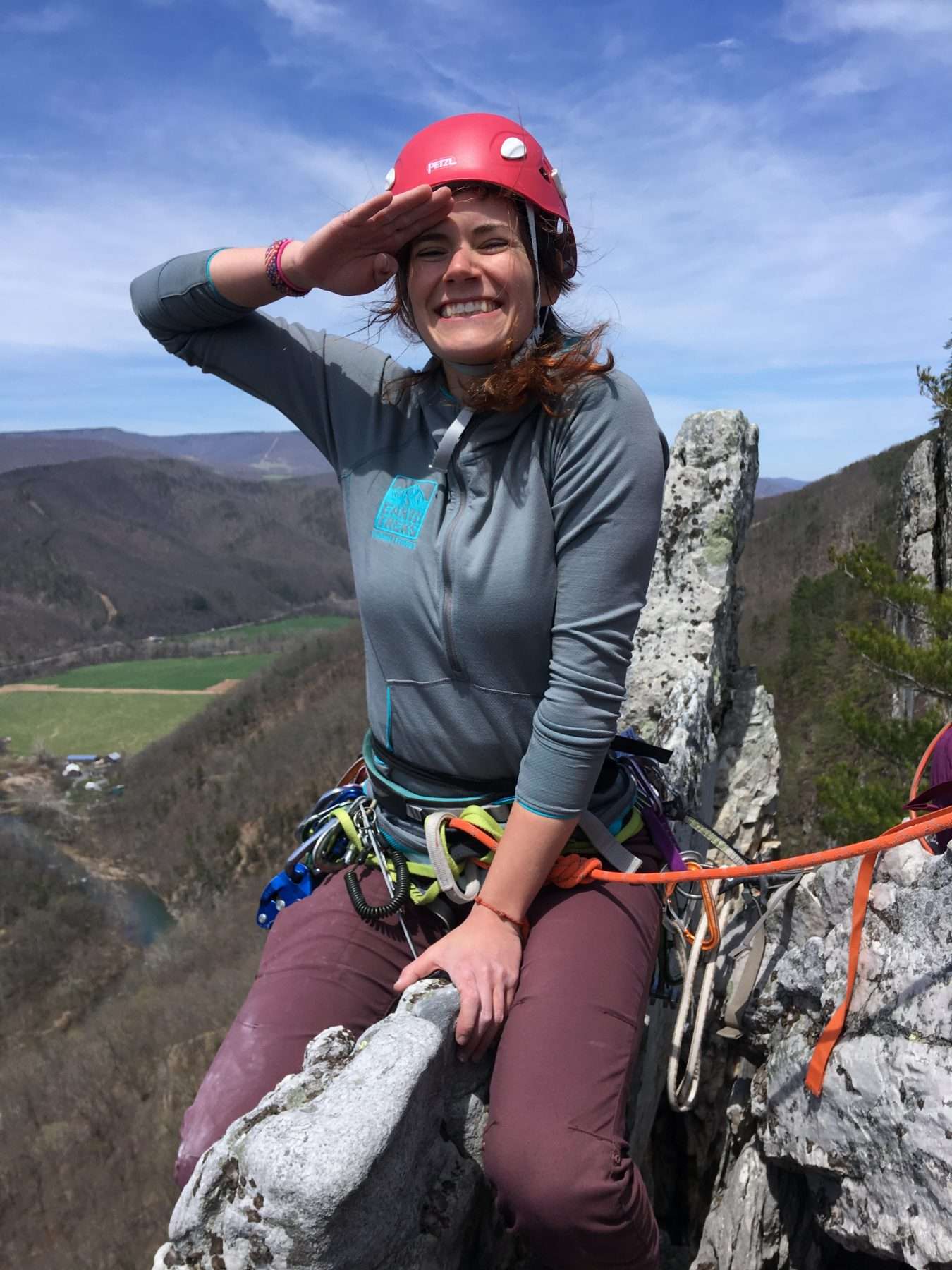
About the Author: Kat Porter
Kat is an Explorer Chick Guide nicknamed the “energizer bunny”. An outdoorsy extrovert, Kat thrives on bringing energy and sharing adventures. Kat has worked as a part of the climbing industry for over a decade. As a competitive rock climbing coach, Kat has trained athletes at the national level. She also holds her AMGA SPI certification as a climbing guide so she can share her passion for climbing with people outdoors. Her favorite local spots to climb are the New River Gorge and Seneca Rocks, WV.
Find her on Instagram: @katmckittens
Read More Hiking Inspiration
- How To Keep Your Feet Warm During Winter Hikes
- Where to Find the Best Hikes in Belize
- The Ultimate 6-Day Croatia Hiking Itinerary, According to Hikers
- Our Ultimate Bucket List of the Best Hikes in Europe
- How Heavy Are Your Thoughts on Trail? Tips for Negative Thinking While Hiking
- Best Hiking Routes in Scotland for the Trailblazer
- What To Wear Hiking In Hot Weather
- How to Lace Boots For Hiking: 7 Pro Lacing Techniques
- How to Identify Poison Ivy (And How to Treat an Allergic Reaction)
- 5+ Amazing Things To Do While Visiting Slovenia



